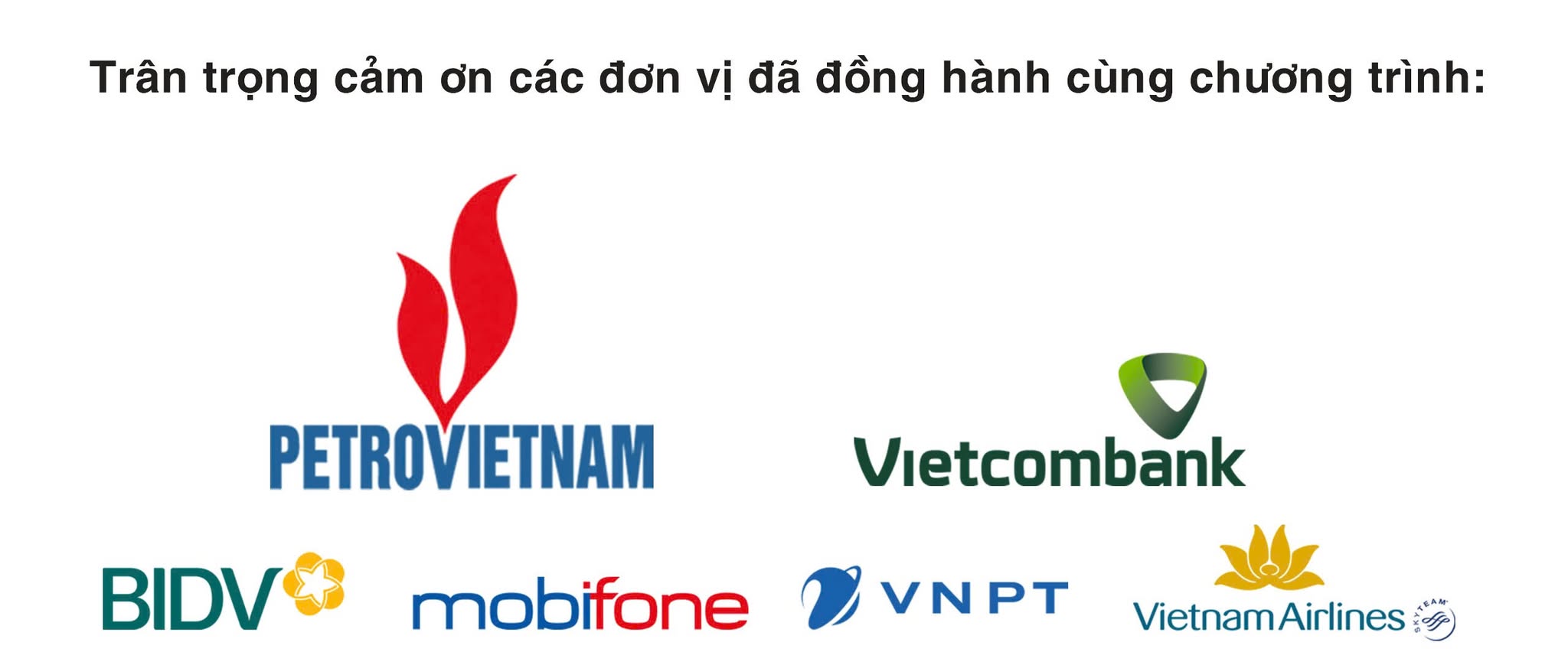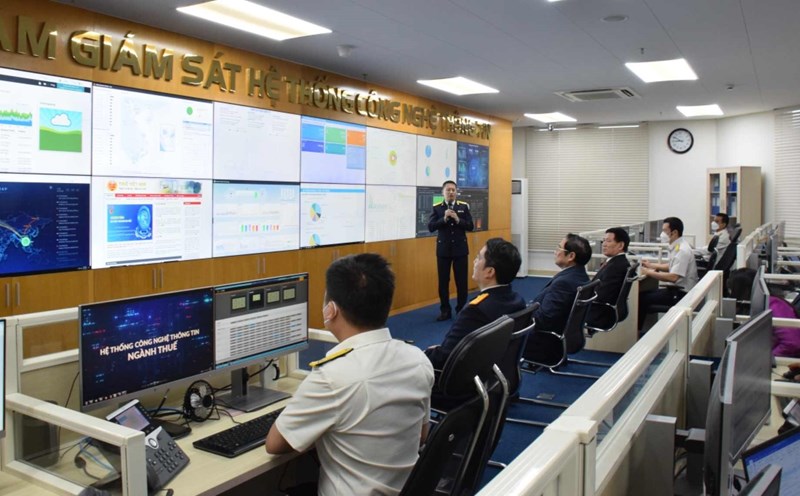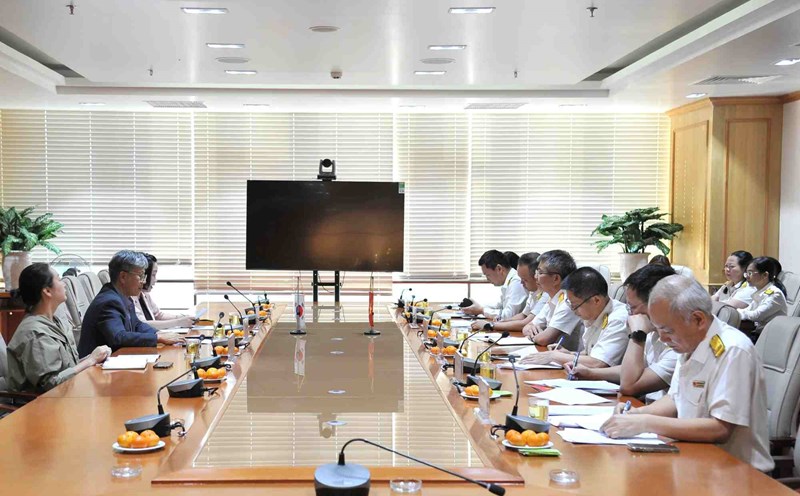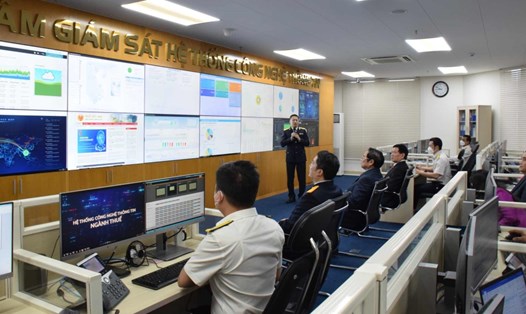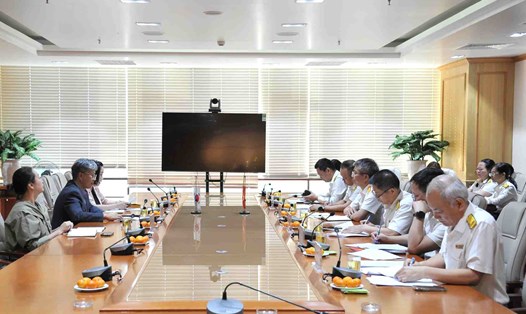17:00: Mr. Mai Son - Deputy General Director of the General Department of Taxation gave a speech to direct and conclude the Workshop.
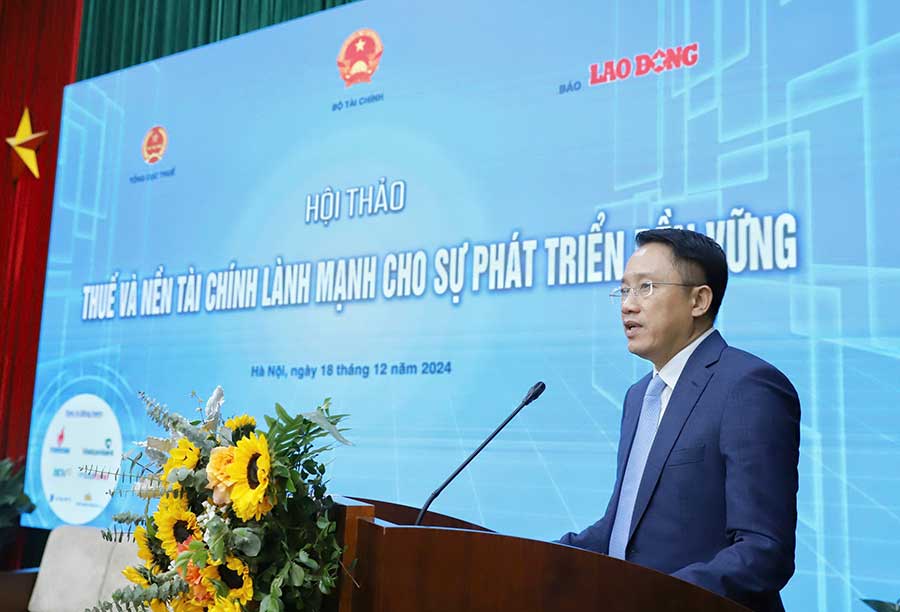
Concluding the workshop, Mr. Mai Son - Deputy General Director of the General Department of Taxation - assessed that after listening to the contributions from delegates and presentations, the roundtable workshop showed the importance of taxes and a healthy financial system for business development.
Over the past time, the General Department of Taxation has accompanied, tried with all efforts and promptly implemented the policies and guidelines directed by the Party, State and Ministry of Finance in contributing to economic development.
With the theme “Tax and healthy finance for sustainable development”, the workshop has described all the issues that businesses are particularly interested in and want to send to the tax authorities.
Mr. Mai Son emphasized that he would accept all opinions and in the coming time (2025), the General Department of Taxation would reform more strongly, contributing to supporting businesses in the tax field to contribute to stability, time, and costs for taxpayers. In addition, continue to further improve transparency in business organization activities, strengthen integration, attract foreign investment and compete fairly with domestic enterprises. All to help businesses get the best support in the tax field.
16:45: In the roundtable discussion, talking about digital transformation in depth, Associate Professor, Dr. Le Xuan Truong, Head of the Department of Taxation and Customs - Academy of Finance shared: "In the long term, we need to continue to stick with digital transformation. And it is not just about digital transformation but also about digital thinking, digital National Assembly, digital Government, digital people... For example, if we want to order personal income tax declaration, the system will notify each individual and if the individual confirms correctly, the tax will be automatically refunded."
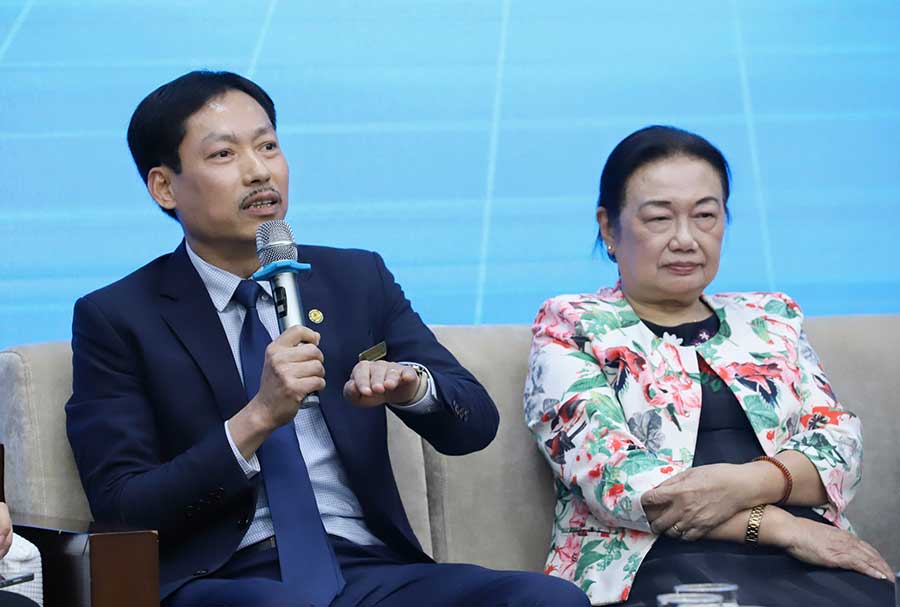
According to Mr. Truong, to do this, it is absolutely necessary to have a whole system, to change the thinking, right from the thinking of the legislator. Towards 2025, how to automatically refund personal income tax. The system will notify each individual of the tax refund amount and if the individual confirms correctly, the system will automatically refund the tax.
16:40: MC: What are businesses most concerned about regarding related tax regulations today, madam?
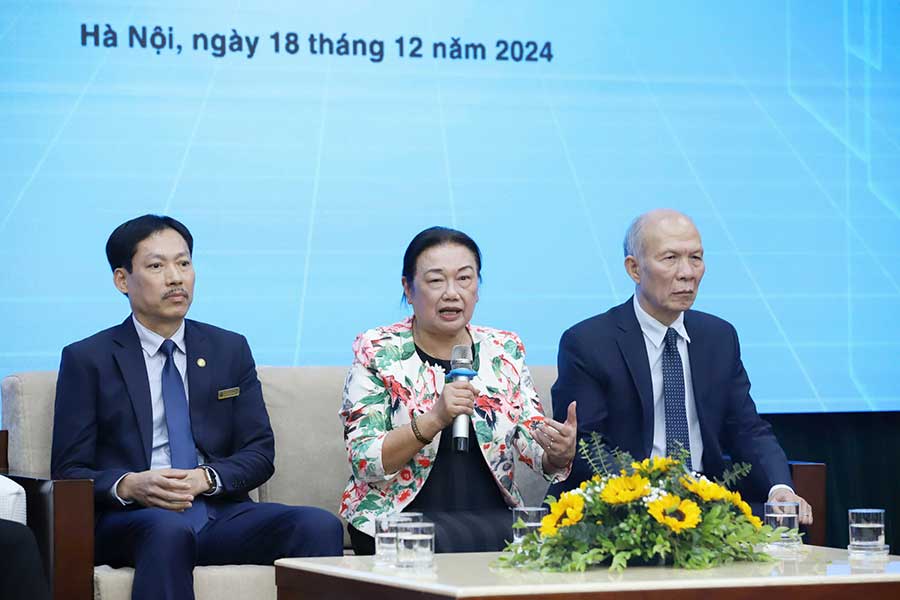
Ms. Nguyen Thi Cuc - Economic expert, President of the Tax Consulting Association - said that what all businesses and entrepreneurs want is a transparent, clear, stable tax policy system that is appropriate for tax subjects. When there are clear policies, more equality will be ensured.
Besides, taxpayers who are enterprises and businessmen want stronger tax administrative procedure reform, reflecting digitalization.
“When we go to other countries, businesses and entrepreneurs are very well supported. But we still have a lot of difficulties, we really hope that domestic businesses will also be well supported and fulfill their tax obligations in the most convenient and favorable way. This will help increase compliance and reduce tax evasion,” said Ms. Cuc, adding that it is necessary to ensure that tax obligations are ensured among all components and subjects…
16:35: MC: What should state management agencies do to harmonize between nurturing revenue sources on one side and applying revenue targets on the other side to ensure the sustainability of state revenue in the new situation?
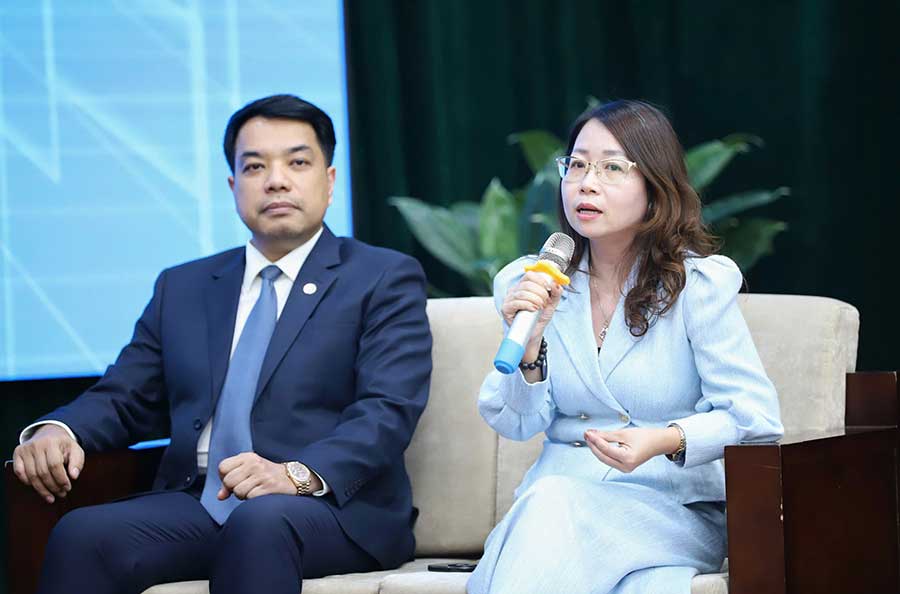
Dr. Le Thi Thuy Van - Deputy Director of the Institute of Financial Policy Strategy - Ministry of Finance - explained that in 2025, the instability of the world economy and politics will strongly affect the economic development and sustainability and state budget revenue of our country.
In 2025 and the following period, most domestic and foreign organizations highly appreciate Vietnam's economic growth prospects. Domestic experts forecast that Vietnam's economy can achieve a growth rate of 6.5-7.5% in 2025.
The International Monetary Fund (IMF) in September 2024 forecast that Vietnam will have a growth rate of 6.1% in 2024-2025 and is the only Southeast Asian representative in the top 10 fastest growing emerging markets.
Regarding solutions, according to Ms. Van: Firstly, effectively implement the Tax laws passed by the National Assembly at the 8th Session and effective from 2025, including the Law on Value Added Tax and the Law on amending and supplementing a number of articles of the Law on Securities, the Law on Accounting, the Law on Independent Auditing, the Law on State Budget, the Law on Management and Use of Public Assets, the Law on Tax Administration, the Law on Personal Income Tax, the Law on National Reserves, and the Law on Handling of Administrative Violations to resolve urgent problems, contributing to removing difficulties in production and business activities. In particular, implementing value added tax reduction for enterprises.
Second, to effectively implement policies, it is necessary to urge the collection of tax arrears, improve the efficiency of tax management for tax collection agencies, prevent fraud, tax evasion, tax losses and arrears, and implement electronic tax management.
Strengthening administrative procedure reform in the fields of tax, customs, etc., continuing to promote the application of information technology and electronic invoices, providing good support for taxpayers.
16:25: Mr. Mac Quoc Anh shared: We acknowledge and highly appreciate the importance of the tax authority in supporting businesses and taxpayers. The role of the tax authority in building a transparent and favorable business environment. The goal of sustainable development, adaptation after the COVID-19 pandemic and the companionship of the tax authority over the years.
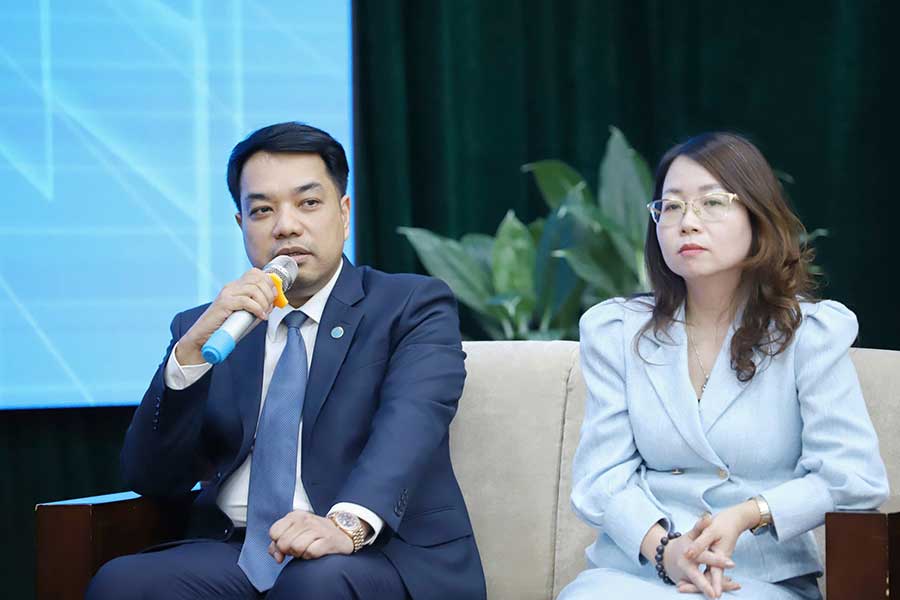
However, in the recent past, there have been some shortcomings. We boldly have the following recommendations and proposals to further improve the operations of the tax sector, support the business community and taxpayers such as: Promoting the application of information technology and digital transformation in the tax sector; Completing tax policies, reducing financial burdens for businesses such as applying lower preferential tax rates for small and medium enterprises, especially start-ups and innovative enterprises; Exempting and reducing corporate income tax for businesses in sectors heavily affected by the COVID-19 pandemic and the global economic recession, such as tourism, logistics and retail; Strengthening support for businesses and taxpayers; Strengthening dialogue and cooperation mechanisms with businesses...
Enterprises, citizens, and taxpayers always have higher demands than before, this is a huge pressure for the tax industry. But I believe that, with the work that the tax industry has done methodically, scientifically, wholeheartedly, and devotedly in the past, the tax industry will perform well in the coming time.
16:15:
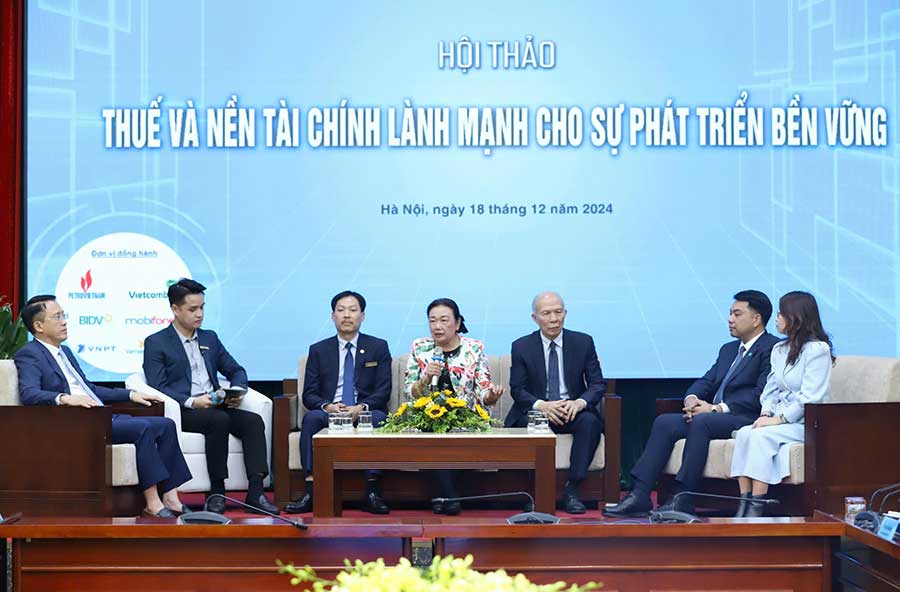
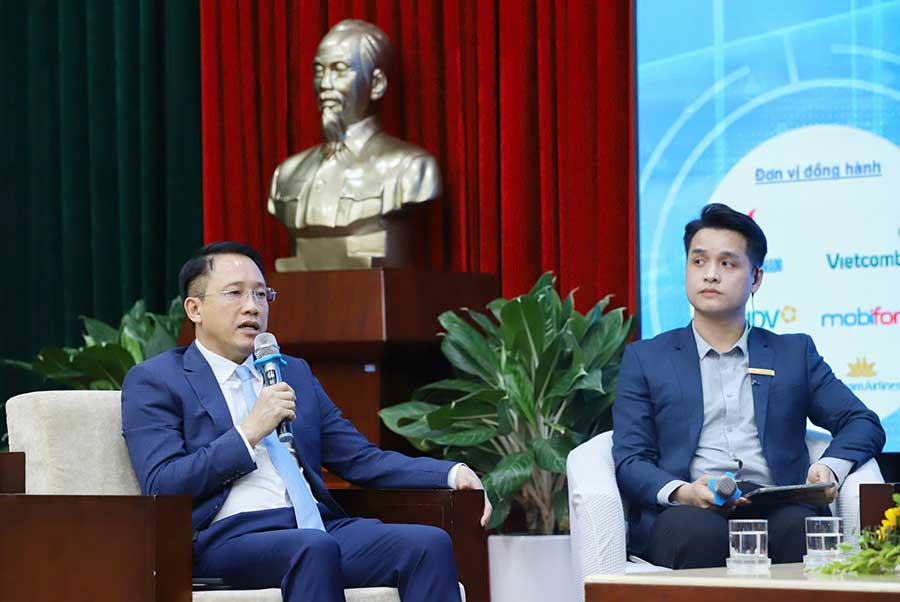

16:10: Roundtable discussion
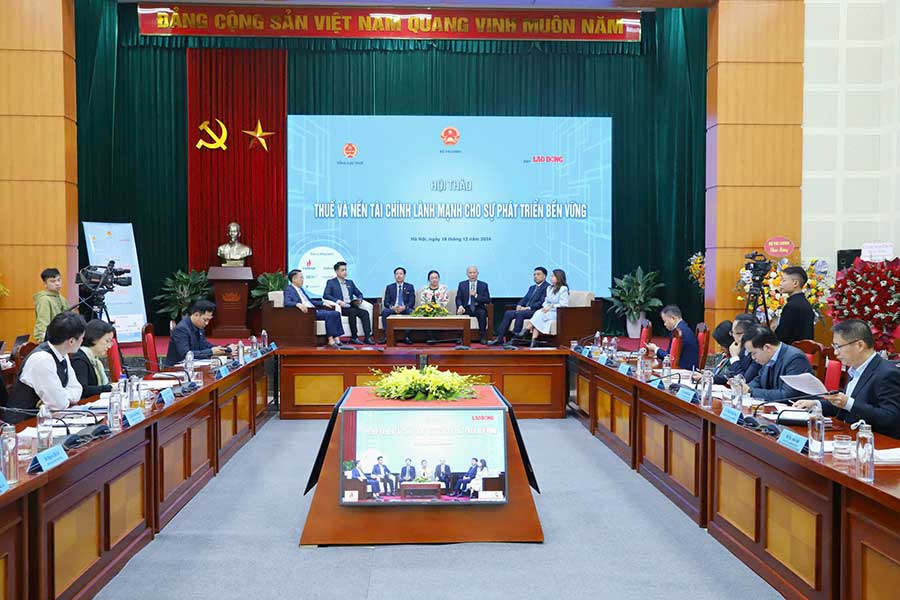
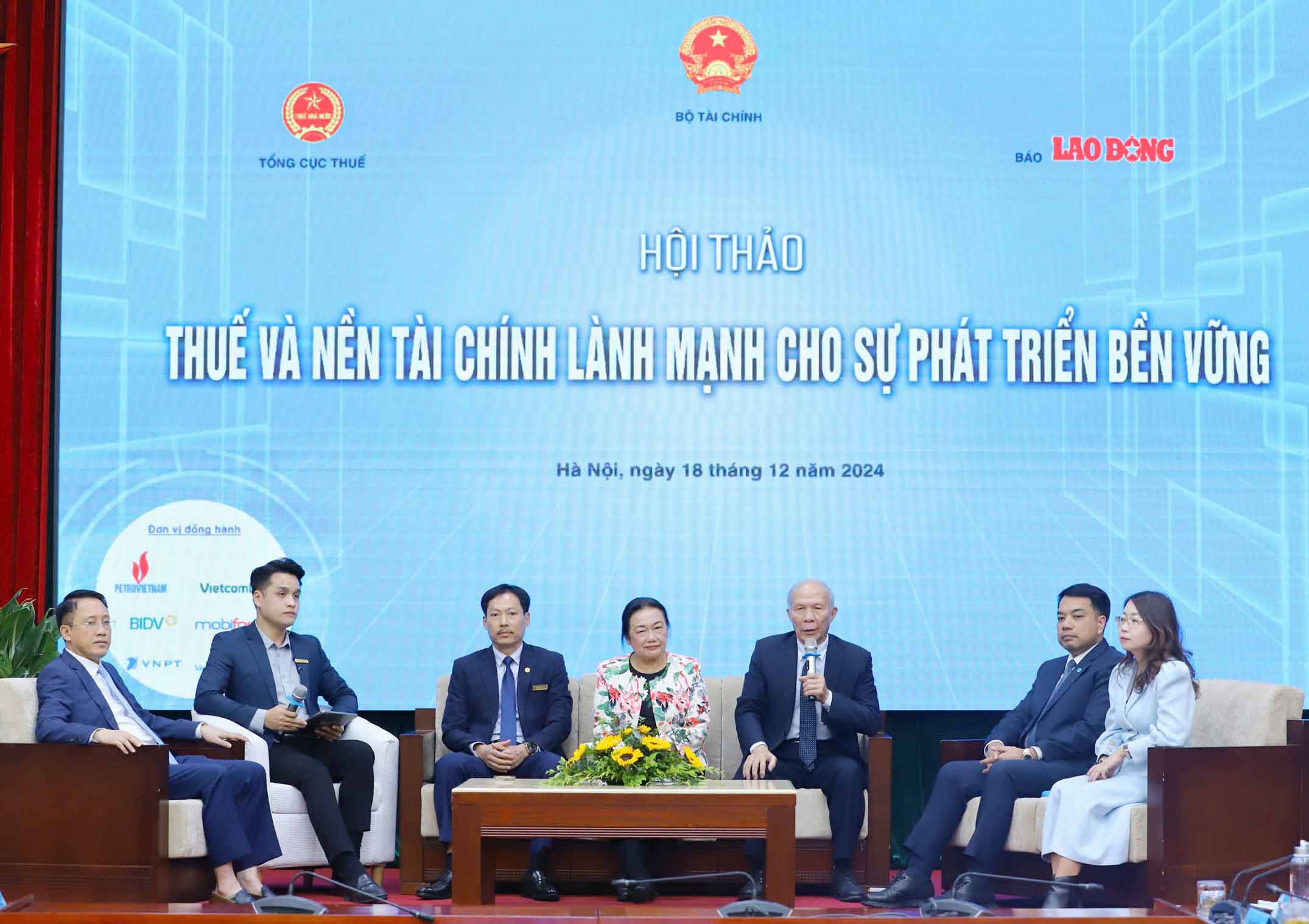
MC: Following the synchronous, unified and effective solutions of the past years, 2025 is the last year to implement the medium-term financial budget plan for 2021-2025. To strive to complete the set goals, we understand that the Finance sector is continuing to advise the Government and the National Assembly on solutions to proactively, reasonably, flexibly and effectively manage the expansionary fiscal policy with monetary policy and other macroeconomic policies; Contributing to supporting economic growth to ensure the budget revenue estimate approved by the National Assembly, stabilizing the macro economy, controlling inflation, and ensuring major balances of the economy.
However, whether the economic scenario in 2025 is the same as in 2024, whether the general budget revenue picture and tax authority revenue will be more difficult or more favorable, and what factors will influence it, all lie ahead.
I would like to ask Associate Professor, Dr. Dinh Trong Thinh: What is your prediction about the general economic and financial picture in 2025, sir?
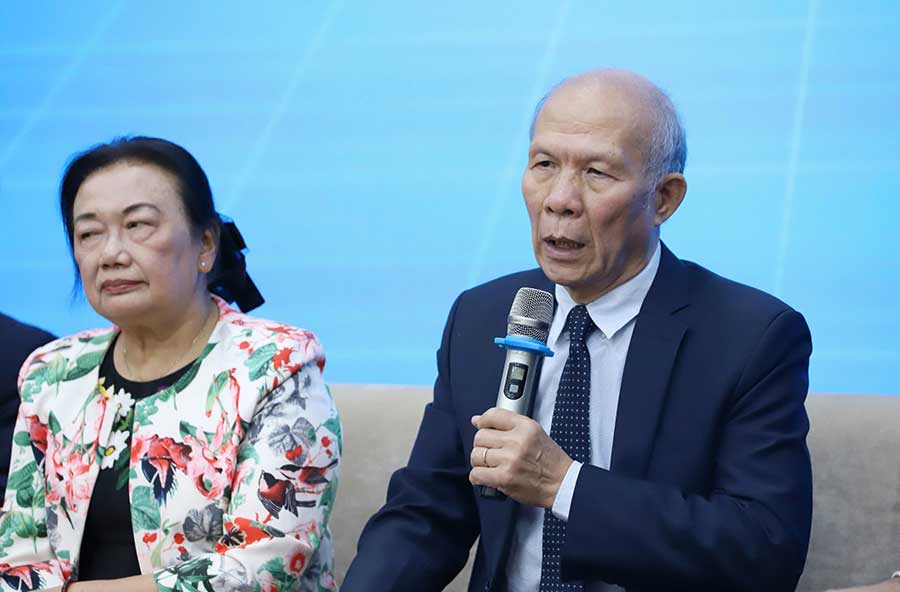
Associate Professor, Dr. Dinh Trong Thinh: Looking back at 2024, the macro economy continues to be stable, inflation is controlled, economic growth is higher than the set target, major balances are guaranteed (with high surplus).
GDP growth in the first 9 months reached 6.82%; the whole year is estimated to reach 6.8 - 7%, higher than the target assigned by the National Assembly (6 - 6.5%), belonging to the group of countries with high growth rates in the region and the world. Total import and export turnover of goods is estimated at 715.55 billion USD, up 15.4% over the same period last year.
The number of international visitors to Vietnam is estimated at 12.7 million, up 43% over the same period last year. I forecast two scenarios for the Vietnamese economy in 2025. In the conservative scenario, we will have GDP growth of 6.8-7.3% with stable inflation in the range of 3.2-3.5%. In the positive scenario, GDP could reach 7.3-7.8% and inflation in the range of 3.5-3.8%.
To realize these goals, we need to focus on maintaining business support policies, attracting foreign investment and improving infrastructure to optimize transportation costs and times.
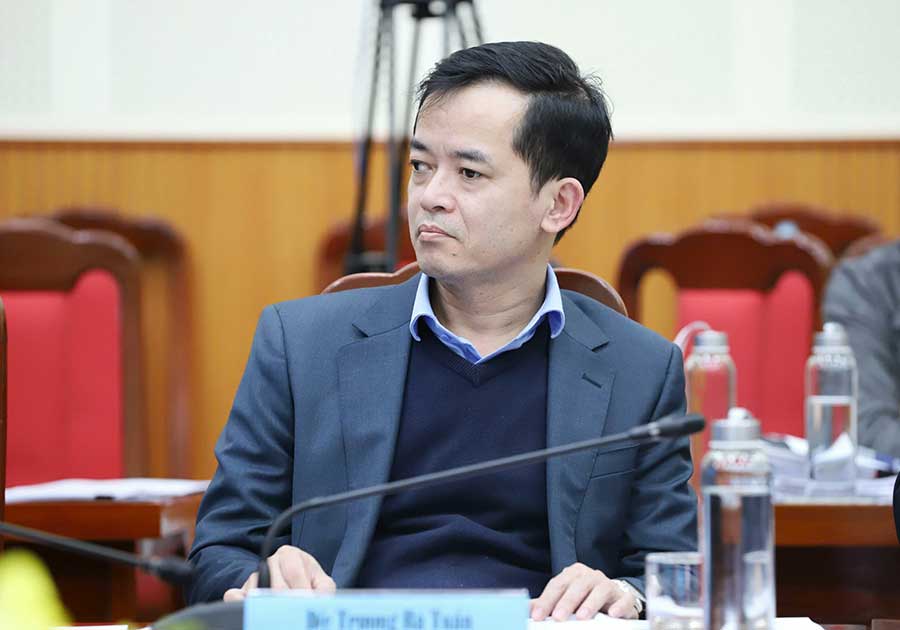







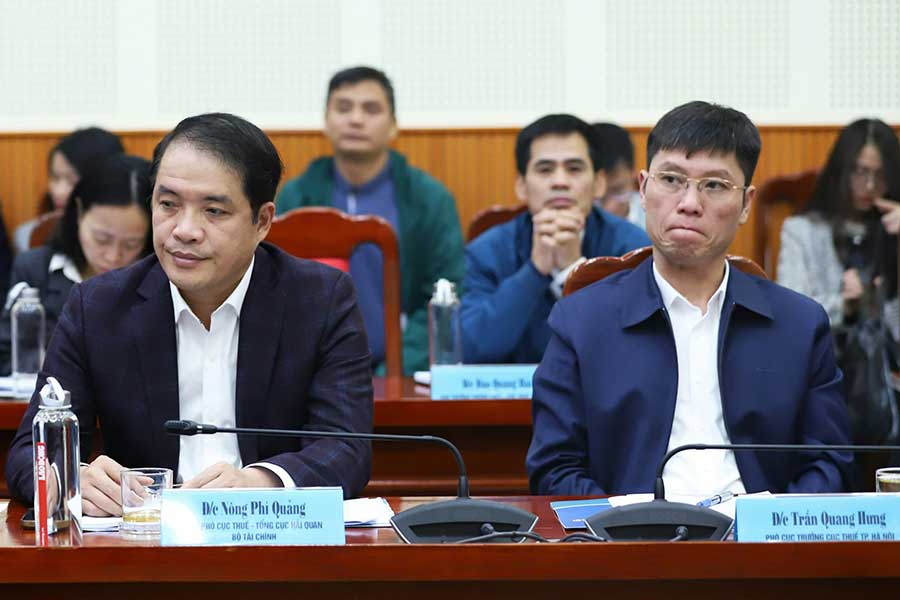
15:35: Mr. Do Hoang Anh Tuan - Deputy Director of the Digital Technology Center (Ministry of Information and Communications) assessed that digital transformation in the Vietnamese Tax sector is an important part of the National digital transformation strategy, oriented by the Government to build a modern, transparent and effective administration.
From the perspective of those directly participating in and managing the digital transformation process, the digital transformation of the Vietnamese Tax sector has outstanding strengths but also faces many challenges that need to be overcome to achieve higher efficiency.
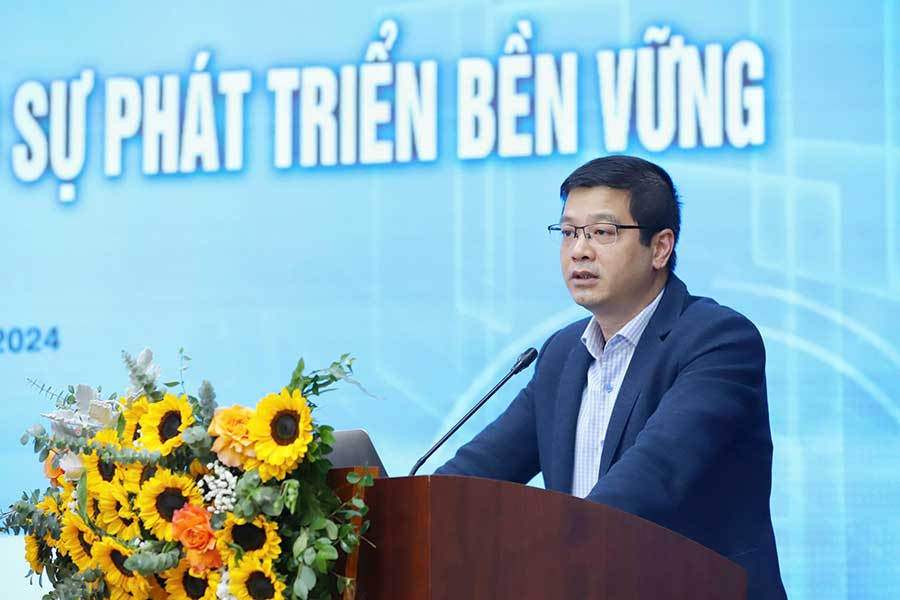
Regarding strengths, according to Mr. Tuan, the tax sector has built a specific digital transformation roadmap, within the general orientation of the National digital transformation strategy to 2030. Goals such as applying electronic invoices, deploying the electronic tax system (eTax) and applying big data (Big Data) are systematically implemented.
In particular, since 2022, the General Department of Taxation has successfully deployed electronic invoices nationwide, reaching a rate of 100% of businesses and individual businesses using them, thereby increasing transparency and resolving errors in tax work.
Level 4 online tax services are widely deployed. This not only helps domestic people and businesses save costs, time, and reduce administrative procedures, but also creates favorable conditions for foreign suppliers to fulfill tax obligations in the fastest, most convenient and transparent way.
The electronic tax system (eTax) is an important step forward in providing personal services. Through the eTax - Mobile application, taxpayers can look up all tax-related information through linking to bank accounts and using other utilities to facilitate the process of finding information in the field of tax and tax calculation. Up to now, more than 98% of businesses have declared and paid taxes online.
The tax industry applies Big Data analysis technology, data analysis to assess risks, monitor tax compliance and detect fraud.
Coordinate with relevant agencies to share data and simplify tax management processes, avoiding tax losses. Tax data of all businesses and individuals has been digitized and integrated into a centralized management system, helping to reduce processing time and improve efficiency.
Regarding the limitations, Mr. Do Hoang Anh Tuan assessed that although the Big Data system has been deployed, the technology infrastructure system is not strong enough to handle large and complex data volumes from digital economic activities, leading to overload or delays in data processing. Cybersecurity risks increase as the number of transactions and digitized data increases.
Regarding technology human resources, Mr. Tuan said that the tax industry still lacks specialized personnel and experts in technology fields such as AI, Big Data, Blockchain, etc.
Regarding user experience, a small number of tax officials have not met the requirements for technological proficiency. In addition, the interface and features of electronic tax services are difficult to use for individuals and organizations with little exposure to technology.
From the above-mentioned shortcomings, the Deputy Director of the Digital Technology Center affirmed that the Tax sector needs to actively implement increased investment in technology, including building a big data system to handle complex transactions and the increasing volume of data from the digital economy.
Design easy-to-use systems, focusing on convenience and user-friendliness; build an online support center with virtual assistant applications to promptly resolve problems for taxpayers.
Apply modern technologies such as AI, Big Data, Blockchain to increase tax management efficiency and ensure data security.
Consider changing the policy to connect with organizations and businesses that pay to automatically determine each individual's income source, instead of requiring people to declare their income for tax calculation.
Focus on training and improving the quality of human resources and coordinating with large technology enterprises to develop human resources and deploy digital solutions.
Develop more detailed and specific regulations on tax management for e-commerce and cross-border transactions and issue clear regulations on information security and handling of violations in the digital environment.
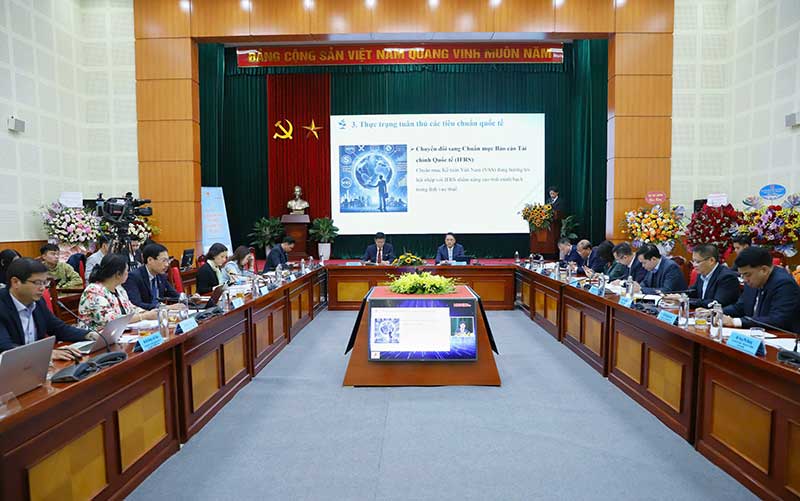
15:15: Mr. Pham Quang Toan - Director of the Department of Information Technology - General Department of Taxation presented a paper on "Digital transformation and modernization of tax collection"
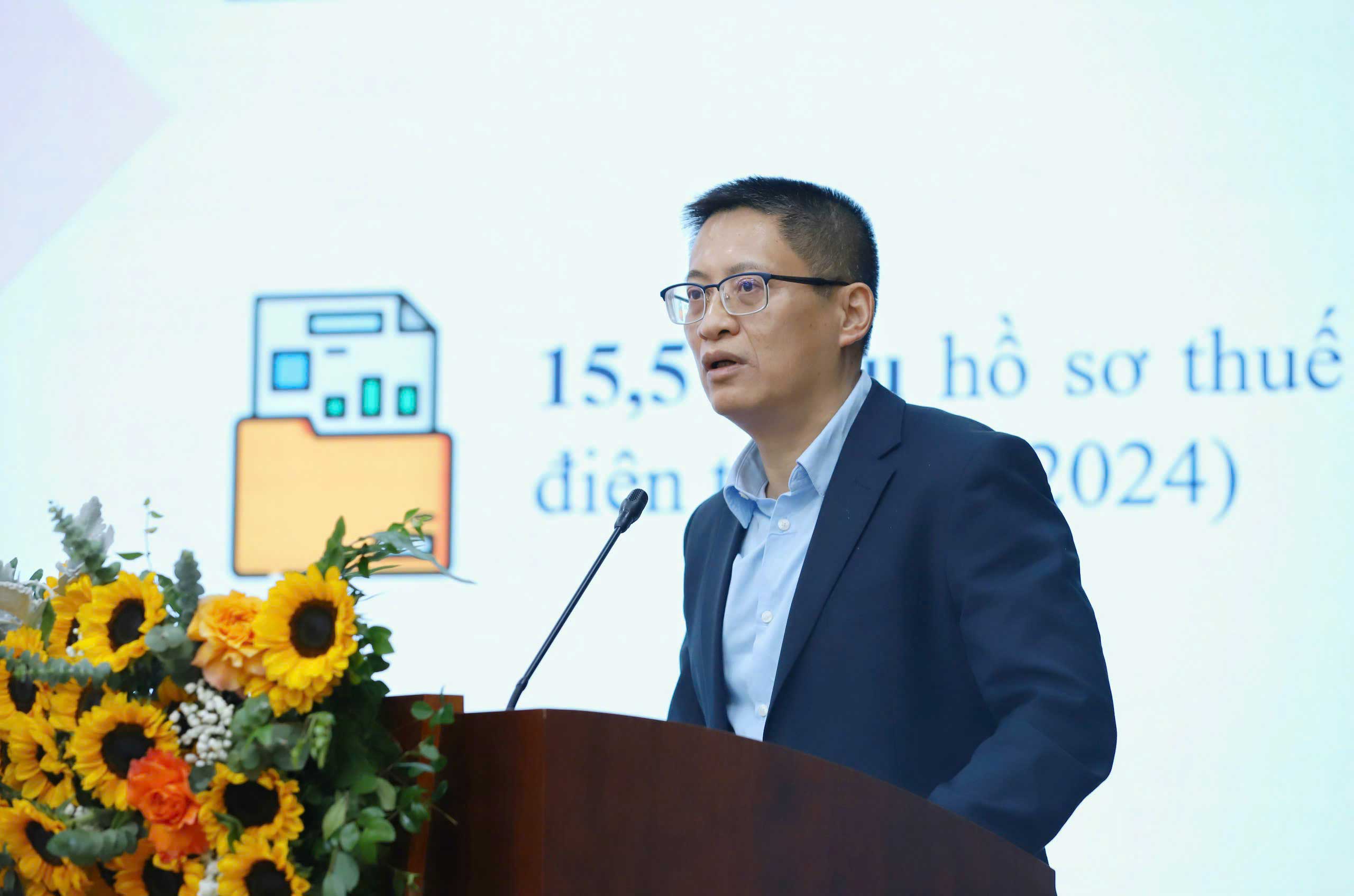
In recent years, implementing the direction of the Government and the Ministry of Finance, the tax sector has always strived to reform and modernize management work, from perfecting the legal environment to developing infrastructure, providing electronic tax services in an integrated and centralized manner, meeting the requirements of e-Government, towards digital Government. With the motto of taking taxpayers as the center of service, the tax sector continues to implement key and important tasks with good results, recognized by the Government, society, businesses and people.
Taxpayers are at the center of digital transformation; meeting the provision of comprehensive online public services; Providing electronic tax services for businesses (eTax); Electronic tax services for individuals (eTax Mobile): Accordingly, supporting the preparation of suggested declarations for personal income tax finalization declarations; looking up changes in tax liability balances; notification of temporary suspension of exit, etc.
Taxpayers can use their electronic identification accounts to log in to electronic tax services. There have been more than 4.6 million registered accounts and 10 million accesses to eTax Mobile using electronic identification accounts (VNeID).
Integrating the national public service portal: Deploying 147 full-process online public services, of which 123 online public services are integrated into the national public service portal. Synchronizing the status of more than 22 million records in 2024. At the same time, connecting, integrating, and synchronizing data with the Ministry of Finance portal and the EMC system (Serving the evaluation and monitoring of public service quality).
Building a large specialized database to serve management and enhance support for taxpayers; Connecting and exchanging tax information with the national financial database.
Regarding electronic invoices: Maintain and upgrade to meet requirements such as monitoring and comparing data on purchase/sale invoices, tax declarations, thereby automatically sending warnings of suspected invoice fraud cases to buyers, sellers, and tax officers.
The results have been 628,000 emails and 305,900 text messages sent; Invoice control on the IT system for businesses that have abandoned their business addresses; Receiving and processing more than 11.2 billion invoices. Creating a large database to serve analysis, risk management and limit illegal invoices, fraud, and tax evasion.
Review and standardize personal tax code data: Control and avoid the situation where a taxpayer has multiple tax codes; Implement the use of identification codes instead of tax codes according to the Law on Tax Administration. Promote connection and data sharing to serve e-commerce development, prevent e-commerce tax loss.
Electronic portal for foreign suppliers: Support foreign suppliers to register, declare and pay taxes directly. As a result, 119 foreign suppliers have registered, declared and paid taxes. The total tax paid in 2024 is VND 8,687 billion.
Portal for e-commerce platforms: Receive information from businesses and individuals doing business on e-commerce platforms that meet the regulations in Decree 91/ND-CP and Directive 18/CT-TTg. As a result, 439 e-commerce platforms sent information to tax and management agencies for 68,431 organizations, 502,000 individuals and 334 foreign organizations and individuals.
Electronic invoices generated from cash registers: 90,904 businesses and business households have registered to use electronic invoices generated from cash registers; 1.23 billion electronic invoices have been received and processed.
Electronic information portal for households and individuals doing e-commerce and digital business: Allowing households and individuals to conveniently and simply register, declare and pay taxes; Supporting more than 500 thousand households and individuals doing e-commerce and digital business. Officially deployed on December 19, 2024.
Apply new technologies such as Big Data Analytics, artificial intelligence (AI)...
Deploying a big data analysis system that applies risk management in automatic tax refund classification, detects abnormal behaviors and issues risk warning chains in tax management.
Deploying electronic invoices helps enhance the ability to monitor, detect fraud, compare invoices and value-added tax declarations, thereby closely controlling tax refund review.
Piloting AI Chatbot to support taxpayers in asking and answering questions about tax policies and laws at Hanoi Tax Department; Piloting virtual assistants to help reduce tax agency resources and improve the quality of taxpayer support.
15:05: Session 2: Modernization reform, digital transformation of tax management
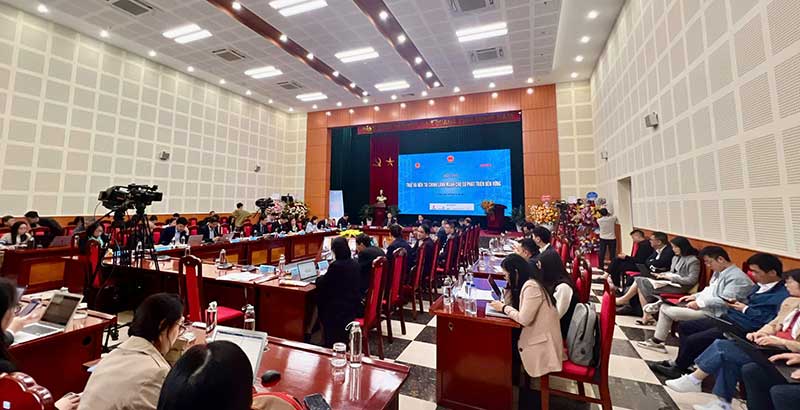
14:45: Mr. Noguchi Daisuke - JICA Expert (Japan), Chief Project Advisor (Japan International Cooperation Agency) said that regarding the situation of JICA's ODA project, since the first phase of the project was launched in August 2005, the General Department of Taxation of Japan and the General Department of Taxation of Vietnam have worked closely together to implement the project throughout the past time.
Currently, the project is in its 5th phase, however, in the early stages of project implementation, there was a time when actual operations could not be carried out due to the impact of the COVID-19 pandemic.
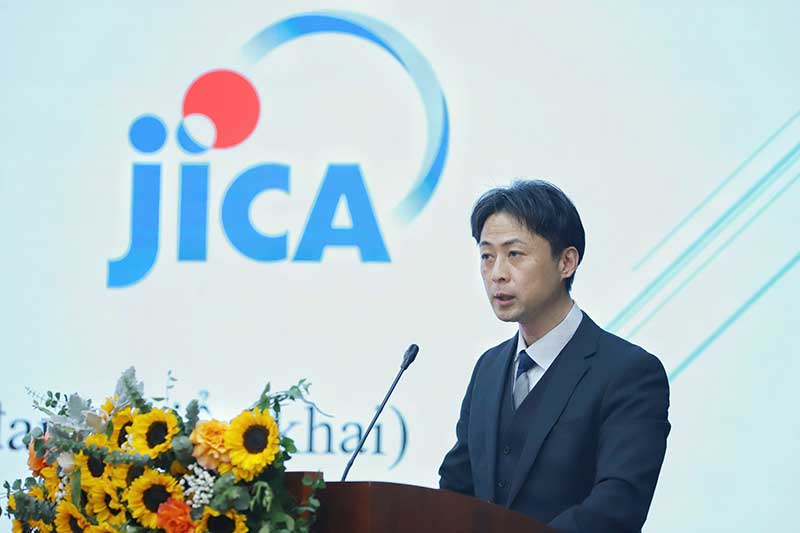
However, we have seen that the friendly cooperation between tax authorities through the JICA framework has been enhanced more than ever.
Regarding economic growth and the importance of budget revenue, according to data from the General Statistics Office, GDP in the third quarter increased by 7.4% over the same period last year. In the first three quarters of the year, GDP increased by 6.82% over the previous year, higher than the growth rate of 2020 and 2021 (when affected by the COVID-19 pandemic and 2023). However, this level is still lower than the first 9 months of 2022.
Compared to the same period last year, the preliminary export turnover of goods in September increased by 10.7%, of which the domestic economic sector increased by 16.0%; the foreign-invested sector increased by 8.8%. Industrial production in the same month also increased by 10.8%.
In addition, foreign direct investment (FDI) flows were also vibrant, with total FDI from the beginning of the year to September reaching 17.3 billion USD, up 8.9% over the same period last year. This is an astonishing figure when viewed on a global scale.
The Vietnamese government has set a GDP growth target of 6.8% to 7.0% for 2024, with room for higher growth. This target is supported by expanding public investment and increasing foreign direct investment (FDI).
“Of course, to support the expansion of public investment, the national budget, that is, increasing budget revenue, plays a very important role,” Mr. Noguchi Daisuke assessed.
In recent years, the remarkable development in Vietnam's tax administration can be attributed to the implementation of the electronic tax system.
To keep up with the booming economic transaction reality, the General Department of Taxation has proactively promoted digital transformation in tax management.
In particular, the electronic tax declaration system aims to improve convenience for taxpayers at a level not inferior to that of electronic tax systems of other countries, making a great contribution to promoting global business.
“In Japan, there is also an e-Tax system that allows tax declaration and payment electronically. However, providing an online portal that allows foreign businesses participating in e-commerce to register, declare and pay taxes directly like in Vietnam is an unprecedented breakthrough in Japan,” said Mr. Noguchi Daisuke.
Since 2024, the Hanoi Tax Department has deployed a virtual assistant to support taxpayers, a breakthrough system using AI and Big Data.
In Japan, there are also similar virtual assistant characters, but the implementation time is not long. In the future, we need to continue to improve to become an even more convenient tool for taxpayers.
The implementation of these electronic tax systems not only brings efficiency and speed in processing procedures but also provides taxpayers with a convenient and easy-to-use platform.
Regarding tax inspection and tax collection, which are the foundation of tax administration, according to the Japanese expert, the General Department of Taxation has made great contributions to improving tax compliance and preventing tax evasion through inspections of foreign-invested enterprises, enterprises related to e-commerce and large enterprises.
In addition, the implementation of the electronic tax payment system and enhanced coordination with local tax authorities have contributed significantly to ensuring stable tax revenue and building taxpayers' trust.
Giving some comments on the compliance with international standards in tax administration in Vietnam, Mr. Noguchi Daisuke assessed that, currently, in the context of globalization taking place at an unprecedented speed, the Vietnamese tax authority has committed to actively complying with international tax standards such as BEPS (base erosion and profit shifting) of the OECD.
For example, to meet BEPS 2.0 and Pillar 2, from 1.1.2024, Vietnam has applied the Global Minimum Tax rule and the Income Aggregation Rule.
In addition, regarding the transfer pricing regime, Vietnam has participated in the BEPS project since 2017 and strengthened the enforcement of relevant regulations. In particular, the application of the Country-by-Country Reporting (CbCR) obligation has been implemented to enhance transparency in transactions between affiliated companies.
According to a representative of JICA, Vietnam's tax administration is developing at an astonishing pace and efforts to meet international standards are also being actively implemented. However, measures are still needed to address some remaining challenges.
In particular, further promoting digital transformation (DX) in tax management, complying with international standards, and expanding the tax administration network to provide nationwide synchronous tax payment services will be the key to supporting the strong and sustainable growth of the Vietnamese economy in the future.
14:35: Mr. Hoang Quang Phong - Vice President of Vietnam Federation of Commerce and Industry VCCI presented the paper "Tax administration reform from the perspective of taxpayers".
In 2024, it is estimated that the number of newly established and resuming enterprises by the end of November 2024 will reach 218,500 enterprises, an increase of 7.4% over the same period in 2023. The contribution of the business sector to the State budget continues to increase, contributing significantly to the State budget revenue in the first 11 months of 2024 reaching a record of over 1.8 million billion VND, exceeding the estimate by 6.3% and increasing by 16.1% over the same period.
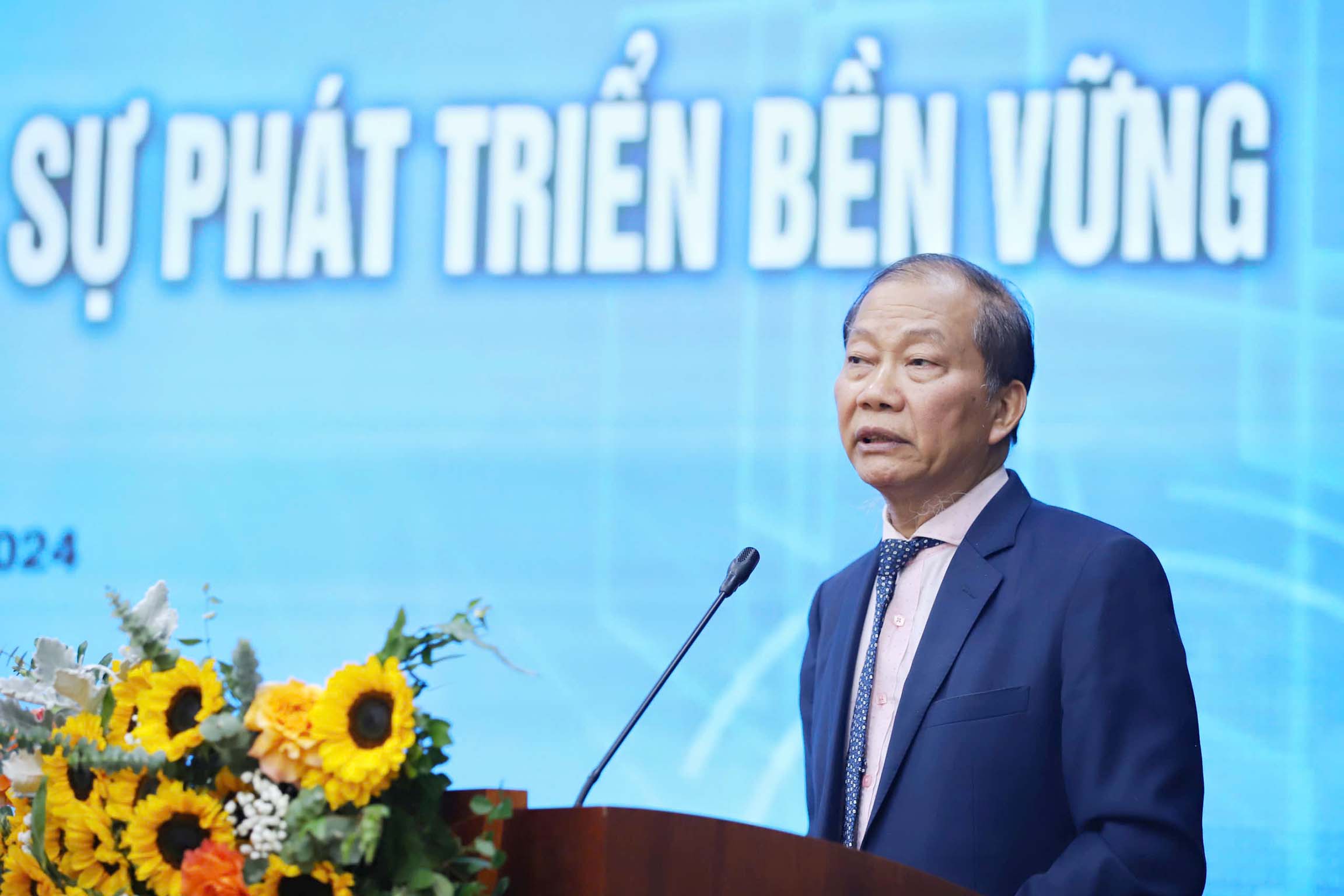
However, 2024 continues to be a year of many difficulties and challenges for the Vietnamese business community. Enterprises must respond to unpredictable fluctuations in the world market; overcome internal limitations and shortcomings that have lasted for many years and must spend a lot of time and resources to solve sudden and arising problems, especially responding to and overcoming the consequences of natural disasters, storms and floods... In the first 11 months of 2024, the whole country had 173,200 enterprises withdrawing from the market, an increase of 9.1% over the same period last year.
In this difficult context, the business community acknowledges that state agencies have promptly issued many policies to support businesses in overcoming difficulties, strengthening confidence and helping to accelerate the recovery process, stabilize and increase production and business activities of businesses.
In particular, the Ministry of Finance has issued appropriate amendments to tax and procedural documents, advised on the timely issuance of policies on tax, fee, charge and land rent exemption, reduction and extension as reported by the Prime Minister to the National Assembly recently, and continued to promote the mechanism of cooperation between enterprises and tax and customs authorities.
The Ministry of Finance has also proactively made great strides in modernization reform in all areas, which has been highly appreciated by people, businesses and organizations. It has always been the leading agency in promoting administrative reform, digital transformation, building e-Government, streamlining the apparatus, and operating effectively and efficiently.
For many consecutive years, the Ministry of Finance has been continuously in the group of 3 ministries and ministerial-level agencies leading the rankings of administrative reform index of ministries, ministerial-level agencies, and People's Committees of provinces and centrally-run cities.
According to the latest survey on the business environment conducted by VCCI in 2024, up to 31% of enterprises still encounter difficulties in implementing tax administrative procedures, especially micro, small and medium enterprises. Some specific difficulties for enterprises when complying with tax administrative procedures are as follows:
There are still cumbersome tax administrative procedures: Although there have been many improvements, the process of tax declaration, payment, refund and tax settlement is still complicated, causing time-consuming and costly expenses for businesses.
Inconsistency in policy application: Some tax regulations have not been interpreted or applied consistently between central and local management agencies, leading to a lack of transparency and unpredictability for businesses.
Uneven application of digital technology: Although the tax industry has undergone strong digital transformation, not all businesses, especially micro, small and medium enterprises, have enough resources and capacity to adapt.
In the coming time, regarding the reform and innovation of tax sector activities and creating favorable conditions for taxpayers to fulfill their tax obligations, based on feedback from the business community, VCCI proposes the following recommendations:
First, promote digitalization in tax management: Improve technology platforms and increase support for businesses in using these systems. For example, build user-friendly portals, integrate artificial intelligence (AI) to answer questions quickly and accurately.
Second, increase transparency and specific guidance: There needs to be detailed, easy-to-understand and consistent guidance documents on the implementation of tax policies, avoiding the situation where each place applies a different style.
Third, research, revise and implement simple and stable tax policies: Simplify declaration forms, minimize overlapping taxes and fees, and maintain policy stability so that businesses can confidently make long-term plans.
Fourth, support micro, small and medium enterprises: For these enterprises, there should be specific policies such as tax exemptions and reductions, support for tax compliance training, or direct consultation.
Fifth, enhance dialogue and consultation: Tax authorities need to maintain regular dialogue channels with businesses to listen to feedback, as well as update practical issues in policy implementation.
Tax administrative reform is a long journey, requiring close coordination between management agencies and the business community. We believe that, with the determination of the General Department of Taxation and the support of businesses, Vietnam will continue to build a modern, transparent and fair tax management system. A favorable tax system not only helps businesses develop sustainably, but also is a driving force to promote the national economy further in the international arena.
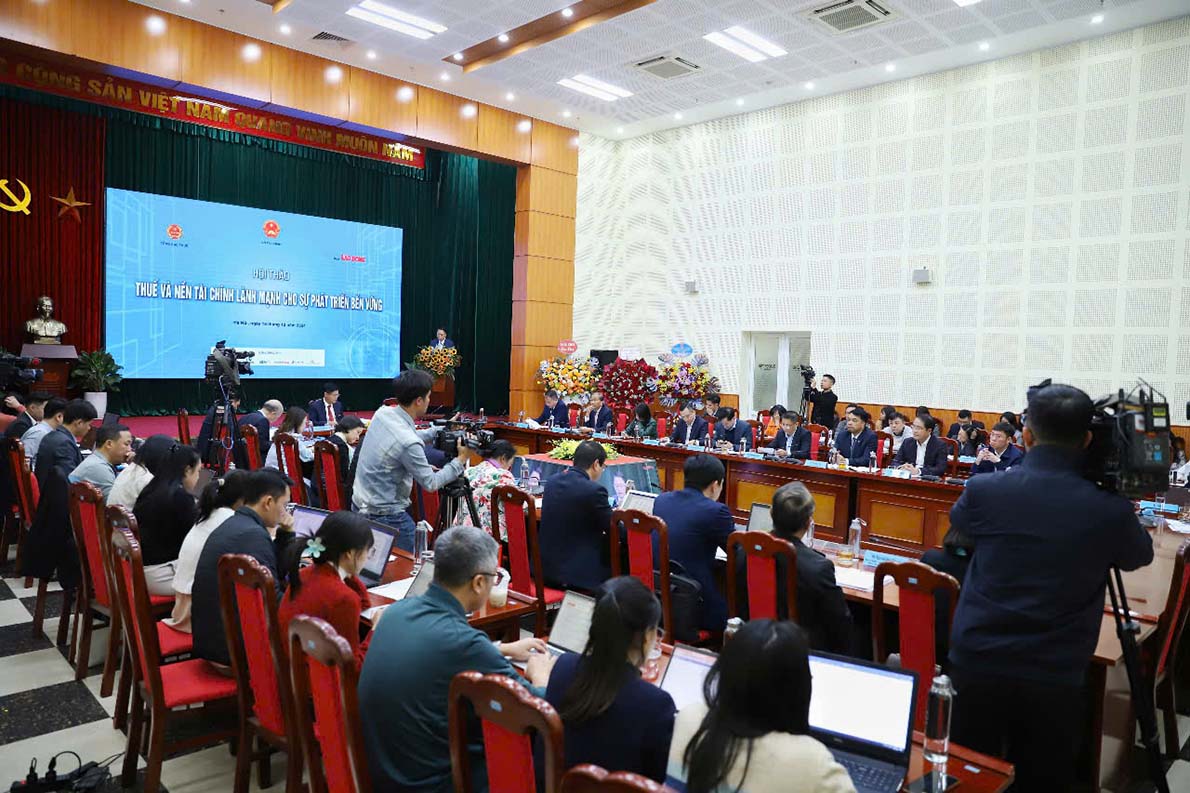
14:20: Mr. Mai Son - Deputy General Director of the General Department of Taxation (Ministry of Finance) - said that implementing the direction in Resolution 23/2021/QH15 of the National Assembly on the 5-year national financial plan for the period 2021-2025, in which the target of the total state budget revenue plan is 8.3 million billion VND.
As of December 2024, total state budget revenue is estimated at about 7.2 million billion VND (86.5% of the planned target).
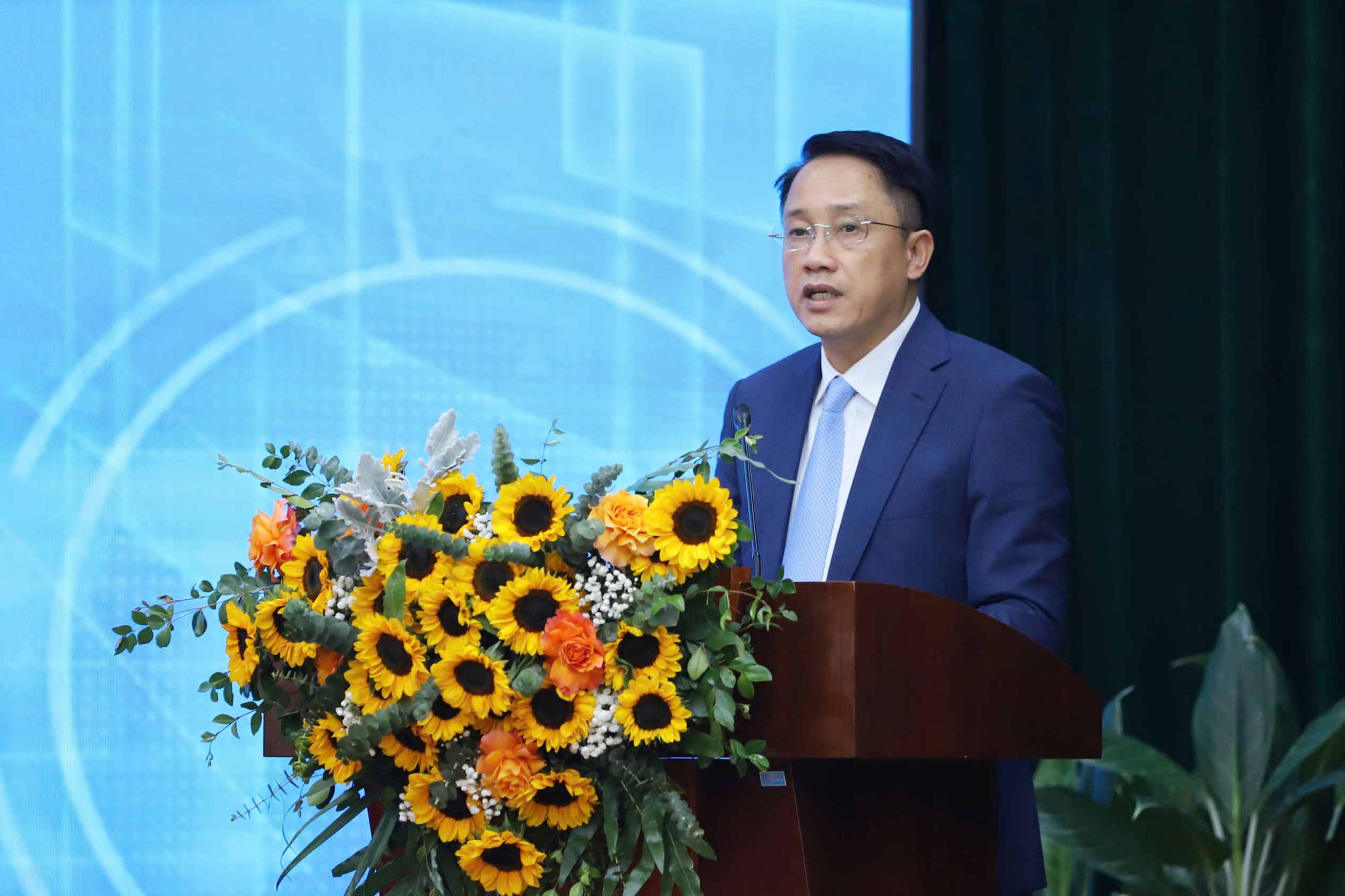
With the above progress, if including the 2025 budget estimate assigned by the National Assembly and the Government, the state budget revenue for the 2021-2025 period will reach about 9 million billion VND, ensuring the completion of the set financial and budget plan target, the mobilization rate into the state budget will reach about 16-17% of GDP, of which tax and fee revenue will reach about 14% of GDP, the proportion of domestic revenue by the end of 2025 will reach about 86% of total state budget revenue.
According to Mr. Mai Son, the above results were achieved due to the drastic direction and management of the Party, State, National Assembly, and Government in flexibly operating fiscal policies and directing ministries, branches, and localities to implement many solutions and organize effective budget collection, ensuring the goal of economic and social recovery and development in the 2021-2025 period, in the context of the domestic economy being heavily affected by the Covid-19 pandemic and fluctuations in the global economy, posing a big problem for stabilizing the macro economy and maintaining sustainable development goals.
Implementing the direction of the Government and the Ministry of Finance, over the past years, the Tax sector has always made efforts, resolutely implemented, closely monitored the health of enterprises, economic developments in the world and in the country, assessed the impact on each revenue item, tax, and locality, and identified risks early to promptly advise the Government and the National Assembly to promulgate and synchronously implement the expansionary fiscal policy packages from the beginning of 2021 to present on a large scale. As soon as the policy packages were issued, the tax sector and tax authorities at all levels promptly organized propaganda, provided implementation instructions, and promptly brought the policies into life.
During the 2021-2024 period, the Tax sector has exempted, reduced, and extended taxes for nearly 3.7 million taxpayers with 8 types of taxes and 36 types of fees.
Effectively implement solutions to support businesses and people through promoting administrative procedure reform, enhancing digitalization, and modernizing budget collection and payment management.
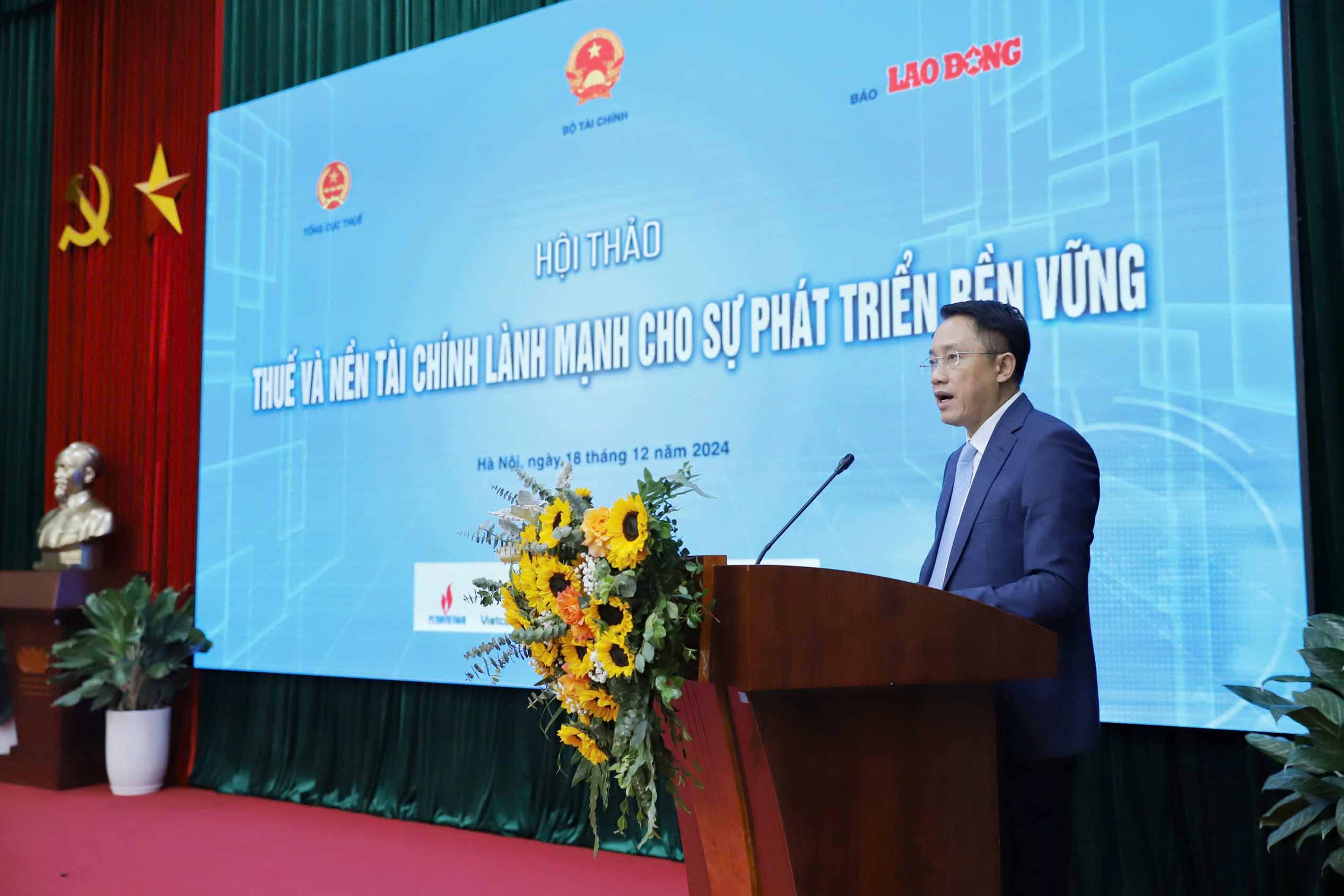
Up to now, 100% of enterprises have participated in using electronic tax declaration services, 99% of enterprises have registered to use electronic tax payment services with tax authorities, 99% of operating enterprises have participated in electronic tax refunds; 100% of enterprises and organizations have participated in electronic invoices.
In 2022, the eTax Mobile application was launched, supporting individual taxpayers via phone, reaching nearly 2.2 million installations with over 3.5 million bank transactions with a total successful payment of VND 7,761 billion.
In 2021, the electronic invoice system was deployed, converting 100% of paper invoices to electronic invoices nationwide, and has so far received and processed over 11 billion invoices.
In 2023, the Tax industry will apply Big Data and AI to manage invoices, quickly detect and prevent invoice fraud, and build digital maps of business, resources, and land.
Regarding e-commerce, tax management data accumulated in the 3 years from 2022 to the first 10 months of 2024 recorded tax collection results from organizations and individuals with e-commerce business activities with the tax paid amount of VND 274.6 trillion.
Building an electronic information portal for foreign suppliers (NCCNN), up to now, 116 NCCNN have registered, declared and paid taxes via the NCCNN electronic information portal from many countries, with the total amount of tax declared and paid to the state budget via the portal reaching more than 20 trillion VND.
The Tax sector has also resolutely carried out inspection, examination and anti-loss work in areas with large potential such as minerals, petroleum, food and beverage services, accommodation, etc., contributing to increasing state budget revenue, from 2021 to present, by about more than 41 trillion VND.
Strictly handle and recover to the state budget about 176.4 trillion VND in debt from taxes, fees, and land revenues, mineral exploitation rights fees... from 2021 to present.
According to Mr. Mai Son, 2025 is the last year to implement the medium-term financial budget plan for 2021-2025. In order to strive to complete the set goals, the Finance sector will continue to advise the Government and the National Assembly on solutions to proactively, reasonably, flexibly and effectively manage the expansionary fiscal policy with monetary policy and other macroeconomic policies.
At the same time, the Tax sector continues to support businesses, taxpayers as the center, closely following the business situation to clearly understand the current "health" of businesses, promptly advising and proposing support solutions. Thereby, promoting economic growth, creating sustainable revenue for the state budget, and comprehensively completing the goals set by the Finance sector.
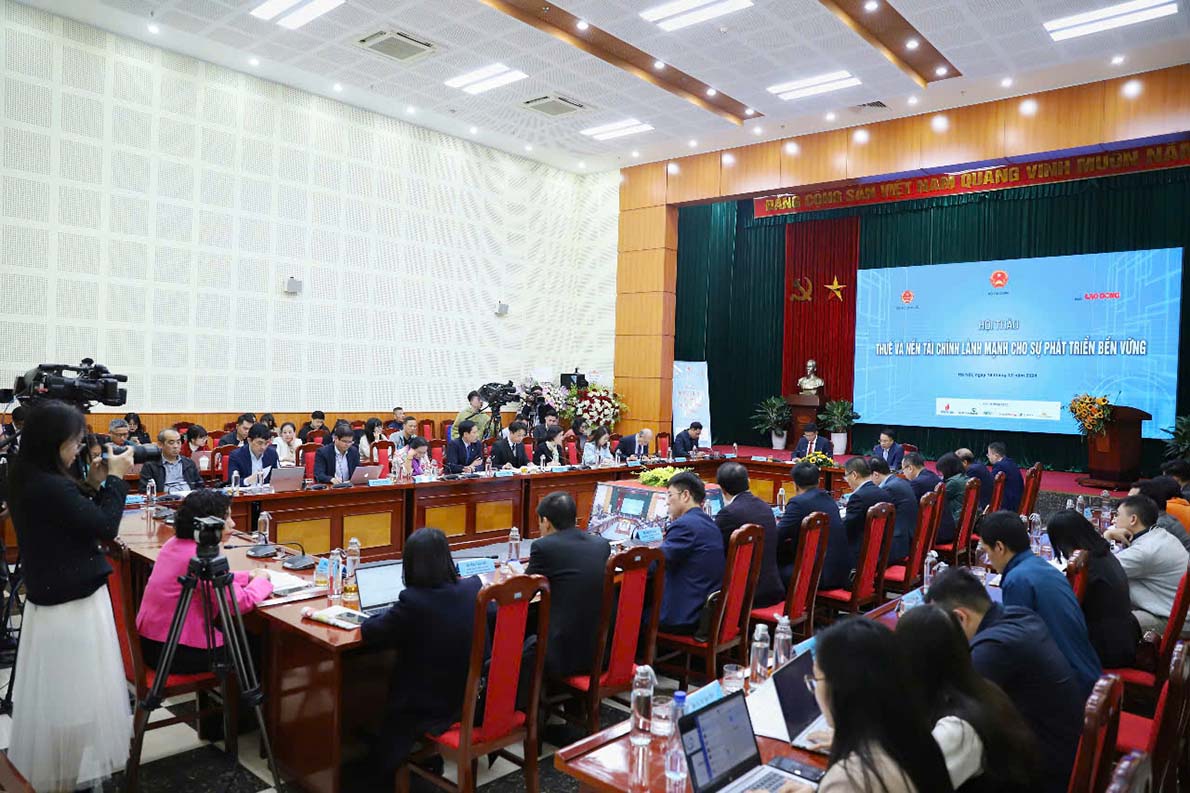
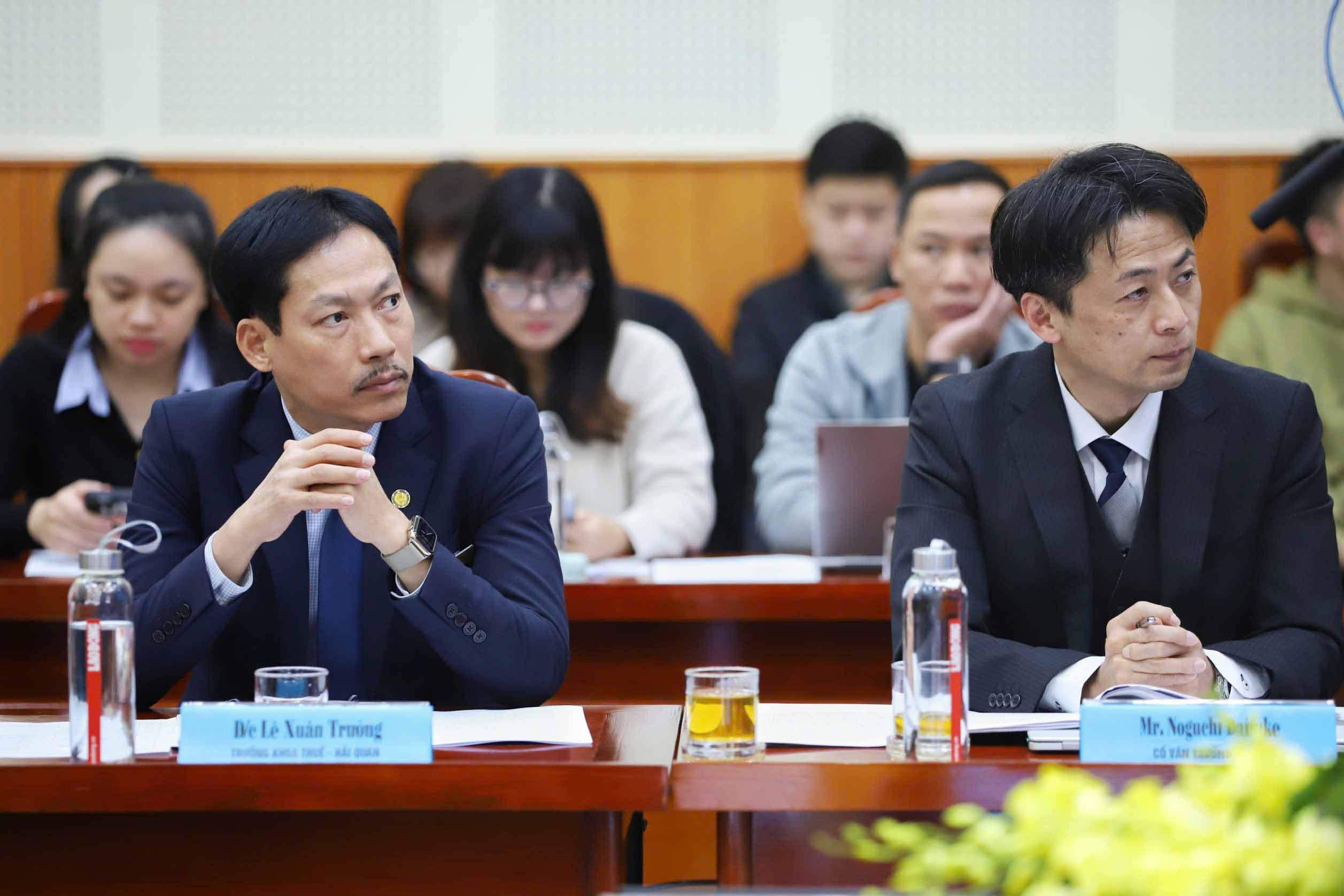
14:15: Session 1: Taxes and a healthy financial system towards sustainable development
14:10: Mr. Nguyen Ngoc Hien - Editor-in-Chief of Lao Dong Newspaper delivered the opening speech of the Workshop
Tax policy over the past years has clearly demonstrated the viewpoint of creating and supporting economic development. Over the past 4 years, tax exemptions and reductions totaling more than VND 800,000 billion are a testament to the efforts of the financial sector, creating a strong driving force for the recovery and development of businesses, individuals and households.
The philosophy of "nurturing sustainable revenue sources" instead of "tightening revenue" has brought remarkable success: Total state budget revenue exceeded the target by more than VND940,000 billion.
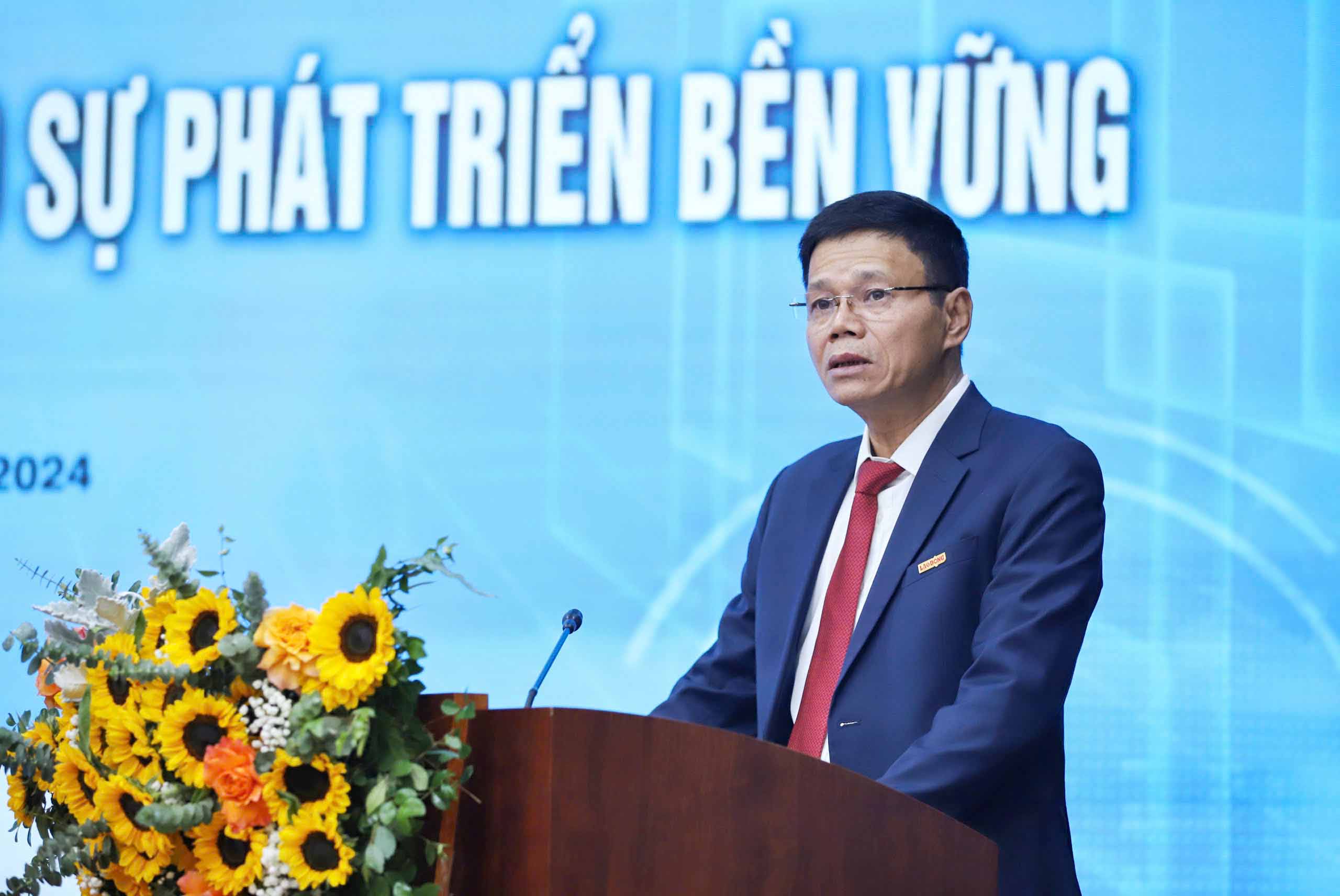
The role of the tax sector goes beyond simply being a budget collection agency, and has made important contributions to creating a transparent, healthy, and equal business environment, contributing to macroeconomic stability.
The spirit of openness, listening and receiving feedback from businesses and individuals is respected, aiming to continuously improve the tax system, increase collection efficiency and ensure sustainable revenue in the long term.
The workshop “Tax and a healthy financial system for sustainable development” hopes to create a forum for management agencies, experts, businesses, etc. to discuss, analyze and propose solutions to optimize tax policies, towards a sustainable financial system for the long-term development of the country.
Today's workshop is honored to have the participation and chairing of leaders of the Ministry of Finance, leaders of the General Department of Taxation and Departments under the Ministry of Finance, representatives of a number of relevant departments and branches, business leaders, associations, economic experts and central and local press and television agencies.
At this workshop, the Organizing Committee wishes to convey the following main contents:
The first is about the State's tax policy. The workshop will analyze how the State's tax policies have contributed to creating a healthy and fair business environment, supporting economic development.
The second is to connect the business community with tax authorities. Close interaction between businesses and authorities is an important bridge in building and perfecting policies, especially tax policies.
Third is to create a forum for commenting on current tax policies and proposing future policies.
On behalf of the Organizing Committee, I would like to thank the leaders of the Ministry of Finance for their support, the General Department of Taxation for its coordination, and the leaders of agencies, organizations, businesses and individuals who attended today's workshop.
Special thanks to colleagues at press and media agencies who participated in writing articles and communicating about the conference. Thanks to the Editorial Board of the Government Electronic Information Portal, Tien Phong Newspaper, and Viet Nam Net Newspaper for their attention and support in broadcasting the conference live on their electronic newspapers.
14:00: Program begins
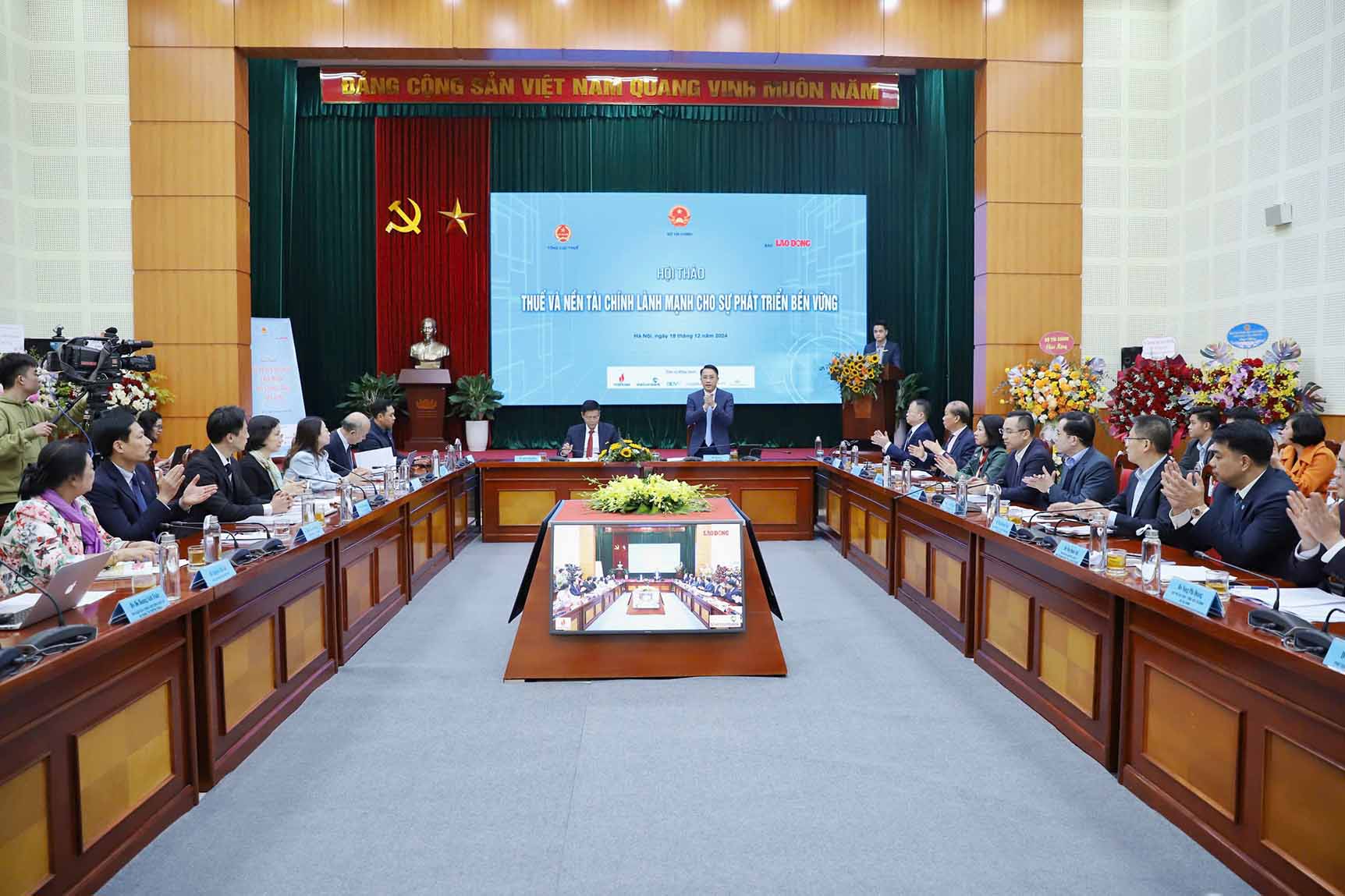
Tax policies in recent years have strongly supported economic development with more than VND800,000 billion in tax exemptions and reductions in 4 years, helping total budget revenue exceed the target of VND940,000 billion.
Along with that, the work of inspecting, handling tax violations and expanding the collection base from e-commerce has contributed significantly to the budget collection results. The tax sector not only collects budget but also creates a transparent business environment, aiming for sustainable and stable revenue sources in the long term.
According to the General Department of Taxation, the total state budget revenue in 2024 managed by tax authorities is estimated to exceed the estimate by 16.5%. With an increase of 13.7% over the same period in 2023; this is the first year that the tax revenue managed by the tax sector has exceeded the milestone of over 1.7 million billion VND.
Thus, from 2021 to the end of 2024, the total state budget revenue is estimated to reach about 7.2 million billion VND, reaching 86.5% of the target for the 2021-2025 period of 8.3 million billion VND. Of which, the total state budget revenue managed by the tax authority accumulated in the 2021-2024 period is estimated to reach about 6.1 million billion VND, equal to 119% of the estimate, with an average growth rate of about 8.6%/year.
2021 - 2025 is also the period when businesses are affected by the COVID-19 pandemic and global geopolitical fluctuations. Maintaining a balance between tax policies and support policies for people and businesses implemented by the Government, the tax sector and relevant agencies have worked together to solve and bring positive results.
The workshop "Tax and a healthy financial system for sustainable development" chaired by the Ministry of Finance, the General Department of Taxation in coordination with Lao Dong Newspaper is the direct organizer with the goal of creating a forum for dialogue and exchange between state agencies and experts, businesses, and the media, together aiming to perfect the tax policy system, contributing to promoting sustainable economic growth.
The conference is being broadcast live on the Lao Dong Electronic Newspaper. At the same time, it is being rebroadcast live on the Government Electronic Information Portal, Tien Phong Newspaper, and Viet Nam Net Newspaper.
